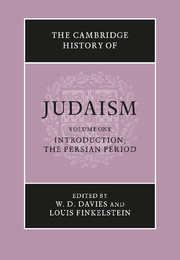Book contents
- Frontmatter
- INTRODUCTION
- THE PERSIAN PERIOD
- 4 The Persian empire and the political and social history of Palestine in the Persian period
- 5 The archeology of Persian palestine
- 6 Hebrew and Aramaic in the Persian period
- 7 The Jewish community in Palestine in the Persian period
- 8 Prophecy and Psalms in the Persian period
- 9 Wisdom literature in the Persian period
- 10 Jewish religious life in the Persian period
- 11 Persian religion in the Achemenid age
- 12 Iranian influence on Judaism: first century B.C.E. to second century C.E.
- 13 The Diaspora
- Bibliographies
- Chronological Table
- Index
- References
9 - Wisdom literature in the Persian period
from THE PERSIAN PERIOD
Published online by Cambridge University Press: 28 March 2008
- Frontmatter
- INTRODUCTION
- THE PERSIAN PERIOD
- 4 The Persian empire and the political and social history of Palestine in the Persian period
- 5 The archeology of Persian palestine
- 6 Hebrew and Aramaic in the Persian period
- 7 The Jewish community in Palestine in the Persian period
- 8 Prophecy and Psalms in the Persian period
- 9 Wisdom literature in the Persian period
- 10 Jewish religious life in the Persian period
- 11 Persian religion in the Achemenid age
- 12 Iranian influence on Judaism: first century B.C.E. to second century C.E.
- 13 The Diaspora
- Bibliographies
- Chronological Table
- Index
- References
Summary
Although the concept of Wisdom is highly problematic, what is known as Wisdom literature – at least in the older Jewish tradition – is easily defined. It involves those literary works in the biblical tradition which have a didactic purpose, yet do not belong to the priestly tradition of the Torah which describes the revealed will of God. The books in question include therefore such texts as Proverbs, Job, Ecclesiastes (Qoheleth), Ecclesiasticus and Wisdom. A series of Psalms has also been regarded as belonging to Wisdom literature, and rightly. Here, however, the category becomes less distinct since the majority of Psalms display certain traits of Wisdom literature, while yet conforming as a whole to the usual patterns of psalmodic composition. As the Psalms are discussed in another chapter, the present essay will refer only to those Psalms which are wholly influenced by the didactic character of Wisdom literature proper. Not until the Hellenistic period do more extensive overlaps occur, so that in addition to the Psalms even those literary works which do not belong to the didactic tradition are strongly endowed with the features of Wisdom literature, for example, Tobit and Baruch.
The dating of Wisdom literature poses greater difficulty – unless it can be traced back to a clearly identifiable historical author such as Jesus, the son of Sirach. Even then the material incorporated in such a work will display a character which is in many respects timeless, so that it can often be identified with older traditions. The book of Job and the bulk of proverb literature doubtless belong to the Persian period, that is, the early post-exilic period up to the advent of Alexander in 332 B . C . E . (In the case of Job one might concede that the final additions, and they alone, were made as late as the Hellenistic period.)
- Type
- Chapter
- Information
- The Cambridge History of Judaism , pp. 189 - 218Publisher: Cambridge University PressPrint publication year: 1984
References
Accessibility information
- 2
- Cited by

